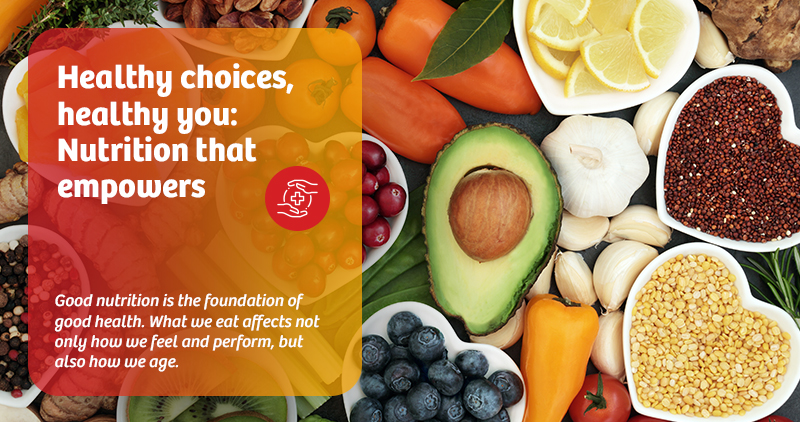

By Dr Archana Jadeja
Consultant Internal Medicine
Nov 17, 2025
Good nutrition is the foundation of good health. What we eat affects not only how we feel and perform, but also how we age. In a world filled with fast food and processed snacks, it’s more important than ever to make mindful choices about what goes on our plate.
Whether you’re a child, adult, or senior citizen, eating balanced, nutrient-rich foods can help maintain energy, strengthen immunity, and prevent chronic diseases like diabetes, heart disease, and obesity. Here’s a simple guide to building a healthy, balanced diet that supports long-term well-being.
1. Eat a variety of foods
No single food can provide all the nutrients your body needs. That’s why variety is key.
A balanced diet should include
By eating a variety of foods every day, you ensure that your body receives a full range of nutrients needed for growth, energy, and repair.
2. Emphasise fruits and vegetables
Fruits and vegetables are nature’s powerhouses — packed with vitamins, antioxidants, and fiber.
These colourful foods help protect against heart disease, cancer, and inflammation.
3. Choose whole grains
Whole grains are richer in fiber and nutrients compared to refined grains. Replace white rice, white bread, or maida-based products with
Whole grains promote better digestion, stabilise blood sugar levels, and help you feel full longer, which reduces unhealthy snacking.
4. Include healthy protein sources
Protein is crucial for building and repairing tissues, producing enzymes, and supporting the immune system.
Choose a mix of
Include oily fish like salmon, sardines, or mackerel at least twice a week — they provide omega-3 fatty acids, which promote heart and brain health.
5. Choose healthy fats
Not all fats are bad! The right types of fat are vital for hormone production and cell health.
Opt for unsaturated fats, such as
Limit saturated and trans fats commonly found in deep-fried foods, baked goods, and processed snacks, as they can raise bad cholesterol levels and increase the risk of heart disease.
6. Limit added sugars
Excessive sugar consumption can result in weight gain, tooth decay, and insulin resistance.
Try to keep added sugar below 10% of total daily calories — and ideally even less.
Your energy levels and mood will thank you!
7. Reduce salt (Sodium) intake
High salt intake doesn’t just make your food salty — it can raise blood pressure and increase heart disease risk. Keep it under five grams (around one teaspoon) daily. Skip salty packaged foods like chips and sauces, and flavour your meals with fresh herbs, spices, or lemon juice instead.
A little awareness goes a long way in keeping your heart healthy.
8. Maintain adequate hydration
Water is the simplest, most essential nutrient. It regulates body temperature, supports digestion, and removes toxins.
Remember: Thirst is a late sign of dehydration — sip water throughout the day.
9. Practice portion control
Even healthy foods can contribute to weight gain when consumed in large amounts. Here are some simple tips for mindful eating
Listen to your hunger cues and stop when comfortably full — not stuffed.
10. Limit ultra-processed foods
Ultra-processed foods, such as instant noodles, packaged snacks, soft drinks, and fast food, are often high in refined carbohydrates, sugars, and unhealthy fats.
Frequent consumption can increase your risk of obesity, diabetes, and cardiovascular disease.
Choose fresh, home-cooked meals whenever possible. Your body and taste buds will appreciate it!
11. Balance diet with physical activity
Nutrition and exercise go hand-in-hand.
To maintain a healthy body weight and metabolism
A healthy diet fuels your workouts, and exercise, in turn, helps regulate appetite and energy balance.
12. Consistency over perfection
Healthy eating isn’t about strict diets or avoiding your favourite foods forever. It’s about making good choices most of the time.
Enjoy occasional treats without feeling guilty — focus on balance and developing sustainable, long-term habits. Small, consistent changes lead to lasting health benefits.
Building a healthy life starts with everyday choices — what you eat, drink, and how you move. A colourful plate, clean hydration, and mindful eating can transform not only your body but also your energy, focus, and happiness.
Remember, a healthy life isn’t created overnight; it’s shaped by the choices you make every day.